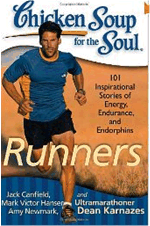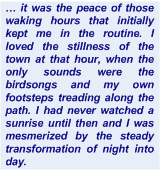101 inspirational stories of energy, endurance, and endorphins… Ron Kaiser, et al
 I’ve run short stories from Ron before, and he’s also been published before in the Chicken Soup series. The Soup book on runners I thought would be fairly prosaic, ho hum stuff. I mean, it’s just running, right? Who wants to think about all the boring minutes on the road while worrying about knee damage? What’s the inspiration? Where’s the human interest? Well, you’d be surprised. A lot of the stories are from women who have used the rigors of running to free themselves from depression or household routine or the desire to pop a Twinkie. Yet the common theme for men and women is a certain spiritual connection they find in the experience of running, in the streets or, better, through nature. — bw
I’ve run short stories from Ron before, and he’s also been published before in the Chicken Soup series. The Soup book on runners I thought would be fairly prosaic, ho hum stuff. I mean, it’s just running, right? Who wants to think about all the boring minutes on the road while worrying about knee damage? What’s the inspiration? Where’s the human interest? Well, you’d be surprised. A lot of the stories are from women who have used the rigors of running to free themselves from depression or household routine or the desire to pop a Twinkie. Yet the common theme for men and women is a certain spiritual connection they find in the experience of running, in the streets or, better, through nature. — bw
The Chicken Soup for the Soul series of books began as a group of inspirational and motivational stories and now has become a cultural icon on the order of Readers’ Digest. Like that publication, most of the Chicken Soup stories are family-oriented, often close to maudlin, and drawing lessons for life from simple and commonplace circumstances. Every Chicken Soup book that I’ve seen contains 101 stories, no more, no less—which I believe was the customary number from the start.
You will find the Chicken Soup for Runners book worthwhile and easy to read, most of the pieces coming from runners rather than writers (I think). I received the book courtesy Ron Kaiser, who is both a runner and a writer. He has three stories in this book:
- “The Side Effect of Fear”—describing the origins of Ron’s running life from his childhood in Laconia, New Hampshire. Seems he had the “ignominious distinction of having been chased by a girl nearly every day of my third-grade life.”
- “The Warrior Woman”—more tenderly recounting how his sister Mary was victim of a serious automobile accident, then turned to running as therapy and an outlet for reclaiming her sense of life. Amazingly, she has run several marathons and continues to do so.
- “Heat Stroke”—Ron’s days in training at Fort Dix, New Jersey, in the Army’s Platoon Leadership Development Course (PLDC), where, being in a hurry, he wound up lost in the swamps. His stamina and ability to run long distances saved his brief military career.
Ron’s stories are from the heart. He’s a gifted writer. Candidly, I have not read all 101 of the short stories for Chicken Soup for Runners. A recurring theme among them is how running delivers a spiritual high. I have marked one particular story, from which I will quote at length. Not from Ron, but from a college student Christina Cherry, who was convinced to run by a roommate, then took to it like a duck to water. Here is the key portion:
… Following her [roommate’s] advice I started out slowly, 20 minutes alternating jogging and walking, then gradually working my way up to a full twenty-minute run. I started out about 5 AM, and I think it was the peace of those waking hours that initially kept me in the routine. I loved the stillness of the town at that hour, when the only sounds were the birdsongs and my own footsteps treading along the path. I had never watched a sunrise until then and I was mesmerized by the steady transformation of night into day.
In the beginning, it was all I could to do to keep my breath flowing. I learned quickly that I had to develop a rhythm in my breathing if I was going to achieve any reasonable distance. I also had to make this rhythm coincide with my body’s movements. It was my mind and body working together, a complete harmony achieved through consistency and focus. I was exhilarated by this newfound sense of balance. For what felt like the first time in my life I felt clear about something. I felt stable and at the same time I felt free.
During my jog I would first focus on my stride and then, once I felt steady, I would just focus on my breath, simply letting it flow in and out in its own natural rhythm. I let my thoughts come and go, holding onto nothing, just watching my breath. It took me a while to realize that what I was doing was actually a form of meditation. By that time I had already begun to notice the [positive] effects in my daily life.
I found myself not dwelling so much on work and school and increasing piles of bills, but on matters far outside the daily trials of life, like the natural rhythms that take place all around us. The natural flow of life that we often fail to notice in our eternal rush. During my run I would observe the seasonal changes and the way the plants and animals would adjust accordingly and I would feel connected to it all.
 Well, you can see if Christina is one of the non-writers, then the editors did an extra special fine job of making her write like one. The above excerpt is characteristic of the wonderful prose coming at you throughout the book. This particular passage also shows the depth of experience offered through the simple practice of running for people both ordinary and not so ordinary. One totally gets the affirmation and the connection, especially if one has done any actual running.
Well, you can see if Christina is one of the non-writers, then the editors did an extra special fine job of making her write like one. The above excerpt is characteristic of the wonderful prose coming at you throughout the book. This particular passage also shows the depth of experience offered through the simple practice of running for people both ordinary and not so ordinary. One totally gets the affirmation and the connection, especially if one has done any actual running.
Well, I have done some running, back in the day. But compared to most of these writers, mine has been of a wholly half-assed variety. However, I was fairly disciplined about it. And, yes, when you reach a certain number of miles, running does provide a Zen-like peak. But getting older and putting an extra bowling ball or two on the frame, I’ve turned to walking, instead… on a treadmill. Hardly the same thing, so with the proper shoes and losing those bowling balls, I’ll pick up running again. Running in nature, not heavy traffic.
Books like this are good for the soul.
You especially appreciate the quotations at the beginning of each story. Critically, what can I say? Basically, the writing is first class, genuine, and nonpretentious. Do such stories probe the deepest corners of the human psyche and explore the immense potential of humankind politically and philosophically? Nahhh. Further, unless you’ve actually read one of these Chicken Soup books, you can’t imagine how the writing of 101 stories about running avoids being repetitive.
I’ve probably mentioned this before, but it bears repeating. Back in the 1970s, a show appeared on television called the Waltons. And it was dynamite with a capital D. For the longest time, I would not agree to take an hour on Thursday night, tune into CBS, and go back to the 1930s to look at the daily lives of some hicks living on a farm in Virginia. Then one night I did sit down… and I was hooked. I don’t think there has ever been a more moving creative television series, ever; I literally cried at the end of 90% of the episodes. At the series finale, I was inconsolable.
I’m not saying Chicken Soup books are in the stellar humanitarian category of the Waltons. But they share the same quality of being easily underestimated, while being able to positively fire the imagination.
This post has been read 1486 times!


